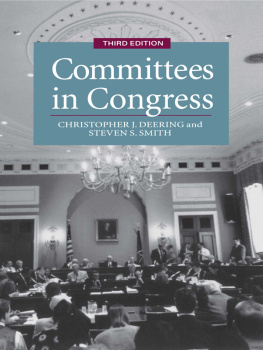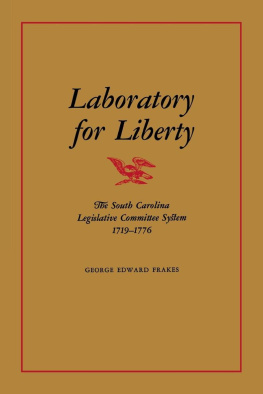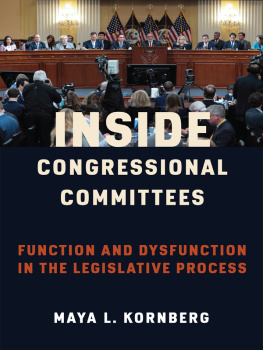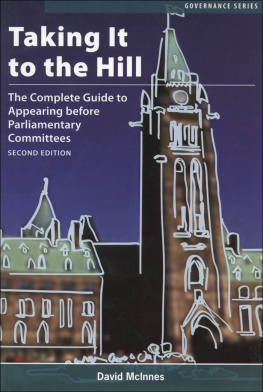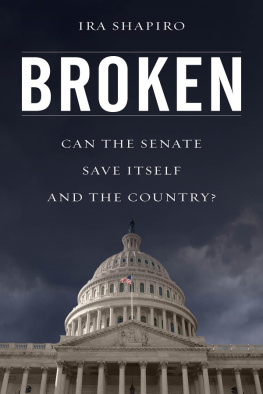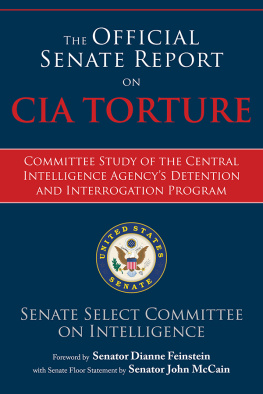Copyright 1997 Congressional Quarterly Inc.
All rights reserved. No part of this publication may be reproduced or transmitted in any form or by any means, electronic or mechanical, including photocopy, recording, or any information storage and retrieval system, without written permission from the publisher.
Printed in the United States of America
Cover design: Naylor Design Inc.
Library of Congress Cataloging-in-Publication Data
Deering, Christopher J.
Committees in Congress / Christopher J. Deering, Steven S.
Smith.3rd ed.
p. cm.
Includes bibliographical references and index.
ISBN 0-87187-818-6
1. United States. CongressCommittees. 2. United States. CongressReform. 3. United StatesPolitics and government19451989. 4. United StatesPolitics and government1989
I. Smith, Steven S. II. Title.
JK1029.S64 1997
328.730765dc21 97-2898
Committees in CongressPreface
Congressional committees have been and remain the central structural element of the United States Congress. Rule and practice in both the House and Senate make it extremely difficult to consider legislation that has not been reviewed by one or more committees. Career-oriented members find that committees, even more than parties, are essential to the achievement of personal political goals. Certainly committees, and the work that they do, increase the efficiency and efficacy of these institutions. But committees are not completely autonomous, and their power has been under siege in recent years. In the House, power has flowed away from the committees to party leaders. In the Senate, the shift has been to the rank and file.
Yet committees are extraordinarily resilient, as this third edition of Committees in Congress demonstrates. Indeed, the dramatic flow of power to House Speaker Newt Gingrich, achieved during the watershed 104th Congress, had reversed to favor committees and committee chairs as the 105th Congress began. And in the Senate, party leaders were searching for ways to limit the atomized power within that chambera move that is likely to increase the power of committees there. Finally, divided party government has fostered a rhetoric of cooperation that reflects recognition of the need for bipartisan policy development within committees. How far will all this go? It is hard to say. But we can be sure that whatever comes, committees will retain their place as central features of these two powerful legislative institutions. Whether they are the agents either of their parent chambers or of the two opposing parties or increasingly autonomous, understanding committees is essential to any understanding of Congress.
Although in broad form this edition of Committees is similar to its predecessors, several changes are worth noting. First, and most important, the debate about committee power that has emerged in the literature during the last decade has been given a more prominent position here. This debatewhich juxtaposes distributive, informational, and partisan theorieshas informed and enlivened the scholarship on Congress and on committees in many important ways. Indeed, it is fair to say that these contending approaches now dominate much of the literature on Congress. It is only appropriate, therefore, that they be introduced more clearly at the outset of this edition and revisited consistently throughout the text.
Second, previous editions of Committees featured a fairly exhaustive historical treatment of the origins and development of committees. In the interest of space, that review has been condensed to make room for a thorough discussion of the most recent round of reforms in the House and Senate.
And third, the second edition closed with a discussion of a series of reforms that had emerged during the late 1980s. In light of the events that transpired during the 103d and 104th Congresses, that discussion now requires revision. features an account of the important reform efforts that emerged, but largely failed, in the 103d Congress and the significant alterations adopted by House Republicans and, to a lesser degree, Senate Republicans in the 104th Congress.
Authors of books of this sort inevitably roll up long lists of debts. For this edition, Roger Davidson (as always), Richard Forgette, Sarah Binder, Forrest Maltzman, Priscilla Regan, Paul Walbeck, and Lee Sigelman read all or parts of the manuscript, suggested important changes, and helped to improve this edition in many tangible ways. For this and for previous editions, Stanley Bach, Bill Connelly, Larry Evans, Paul Herrnson, George Kundanis, Walter Oleszek, Bruce Oppenheimer, Jack Pitney, Judy Schneider, Ken Shepsle, Barbara Sinclair, Jim Thurber, Joe Unekis, and Don Wolfensberger provided facts, data, ideas, guidance, and assistance of a sort that marks the scholarly community at its best. As with the previous editions, this edition has been enhanced in tangible and intangible ways by the American Political Science Associations Congressional Fellowship Program and by support from the Dirksen Congressional Leadership Research Center.
I am grateful to David Chambliss, Job Henning, and Mark Kugler, who put in long hours collecting documents and data for this edition. And Rachel Paine Caufield, Jason MacDonald, and Christine Nemechek did yeoman work in the midst of their busy schedules to collect much-needed data at the twelfth hour. I am indebted (and in debt) to them. Finally, it is time to thank John Zorotovich for providing me with a number of keen insights over the years.
This book would not exist if Jean Woy, formerly of CQ Press, had not placed her faith in two untested scholars back in 1981. Since then, a variety of people at CQ have shown continuing faith in the book. Brenda Carter, in particular, has extended that tradition. Tracy Villano edited the manuscript, Talia Greenberg guided the manuscript through final production, Rhonda Holland put together a thorough index, and Julie Rovesti prepared the promotional materials. I am grateful for their patience, professionalism, and encouragement.
Finally, although much of the data in this and previous editions are taken from archival sources, the willingness of present and former members of Congress and their staff to assist in a variety of ways was essential. At a time when access is increasingly difficult, the continuing generosity of many members and their aides is greatly appreciated.
C. J. D.
Washington, D.C.
CHAPTER 1
Committees in Congress
On January 4, 1995, the U.S. House of Representatives met under Republican control for the first time in forty years. During the course of the day, into the evening, and on past midnight, the new Republican majority eliminated three committees, altered committee jurisdictions, cut committee and subcommittee staff, lowered existing limits on subcommittee membership, restricted the practice of proxy voting, and established term limits for committee and subcommittee chairs. These changesand there were othersmarked the most dramatic alteration in the House committee system in two decades. That same day saw the U.S. Senate meet under Republican control for the first time since 1986. The Senate, with fixed rules spanning from one Congress to the next, quietly went about the business of shifting to Republican control. It made no changes in its committees, subcommittees, rules, or procedures. The single proposed rule change, one which would have made limiting debate easier, was rejected by a lopsided vote.

